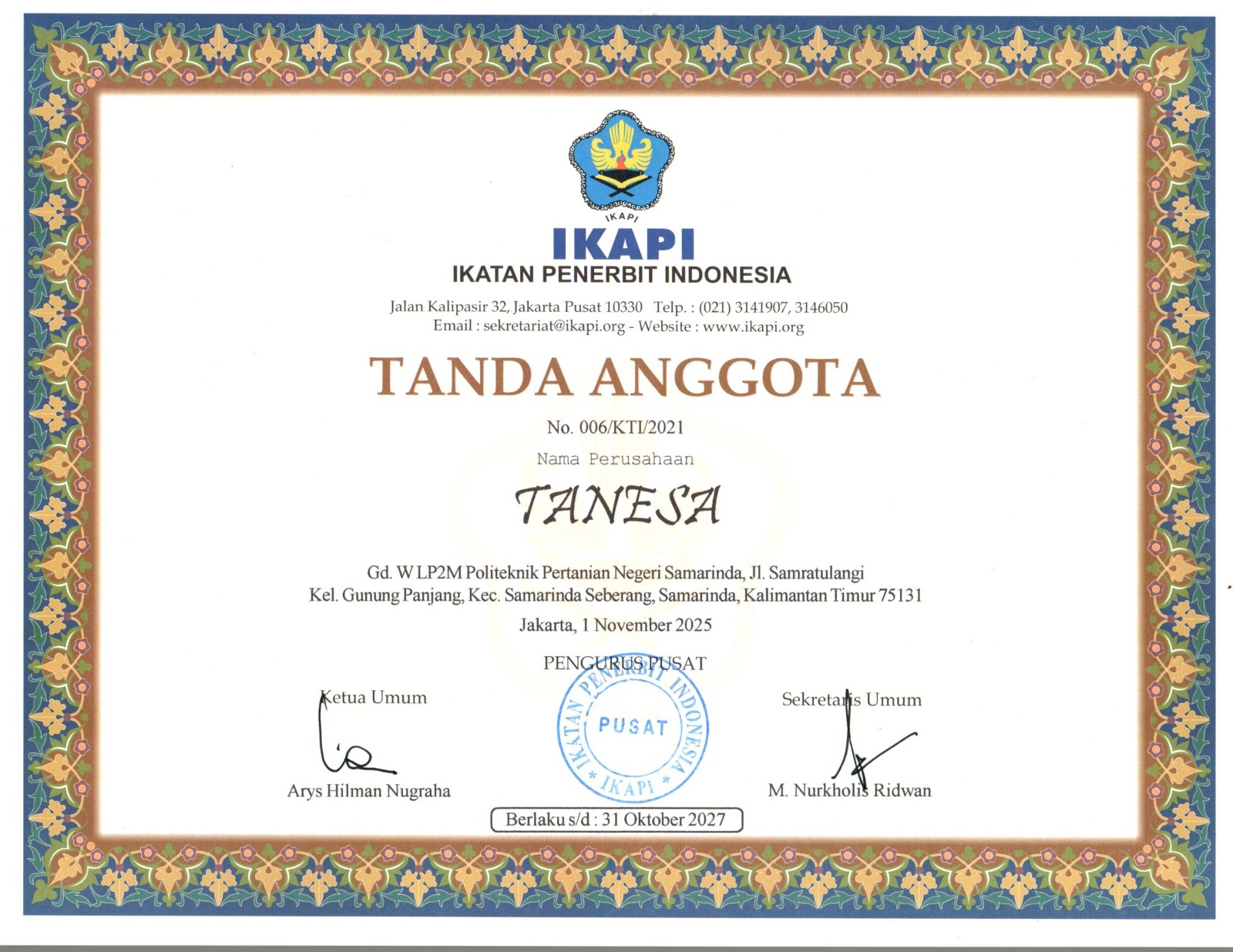
FURNITURE: Desain Interior Rumah Minimalis Tropis
Synopsis
Buku ajar yang berjudul Desain Interior Rumah Tinggal Minimalis Tropis adalah buku ajar yang ditujukan untuk mahasiswa Program Studi D4 Rekayasa Kayu Politeknik Pertanian Samarinda pada Mata Kuliah Furniture. Mempelajari tentang interior rumah tinggal minimalis tropis dijabarkan dalam beberapa unit pembelajaran, yaitu konsep desain interior rumah tinggal minimalis dan ergonomic desain interior rumah tinggal minimalis. Diharapkan dengan buku ajar ini mahasiswa dapat mengembangkan lebih kreatif dalam membuat desain interior rumah tinggal minimalis tropis.
References
Ball, B. L., Long, N., Fleming, K., Balbach, C., Ball, B. L., Long, N., Fleming, K., Balbach, C., Ball, B. L., Long, N., Fleming, K., & Balbach, C. (2020). An open source analysis framework for large-scale building energy modeling An open source analysis framework for large-scale building energy modeling. https://doi.org/10.1080/19401493.2020.1778788
Bamdad, K., Cholette, M. E., Bell, J., & Bell, J. (2020). Building energy optimization using surrogate model and active sampling. https://doi.org/10.1080/19401493.2020.1821094
Brunetti, G. L., & Brunetti, G. L. (2020). Increasing the efficiency of simulation-based design explorations via metamodelling Increasing the efficiency of simulation-based design explorations via metamodelling. 1493. https://doi.org/10.1080/19401493.2019.1707875
Energyplus, E. M. S., Sardoueinasab, Z., Yin, P., & Neal, D. O. (2020). Pemodelan energi dan analisis unit terminal bertenaga kipas aliran udara variabel menggunakan Energy Management System. 1493. https://doi.org/10.1080/19401493.2019.1679260
Evins, R., Alexandra, R., Wiebe, E., Wood, M., Eames, M., Evins, R., Alexandra, R., Wiebe, E., Wood, M., & Dampak, M. E. (2018). Dampak variasi lokal dalam iklim maritim sedang pada penggunaan energi bangunan. 1493. https://doi.org/10.1080/19401493.2018.1536167
Evins, R., Alexandra, R., Wiebe, E., Wood, M., Eames, M., Evins, R., Alexandra, R., Wiebe, E., Wood, M., & Eames, M. (2018). The impact of local variations in a temperate maritime climate on building energy use. Journal of Building Performance Simulation, 0(0), 1–17. https://doi.org/10.1080/19401493.2018.1536167
Fathollahzadeh, M. H., Tabares-velasco, P. C., & Tabares-velasco, P. C. (2020). Building control virtual test bed and functional mock-up interface standard : comparison in the context of campus energy modelling and control ABSTRACT. 1493(May). https://doi.org/10.1080/19401493.2020.1769191
Gagnon, R., Gosselin, L., Park, S., Stratbücker, S., Gagnon, R., Gosselin, L., Park, S., & Stratbücker, S. (2018). Comparison between two genetic algorithms minimizing carbon footprint of energy and materials in a residential building. 1493. https://doi.org/10.1080/19401493.2018.1501095
Gasparella, A., & Mahdavi, A. (2020). Special issue on the microclimatic boundary conditions in building simulation models. 1493, 2019–2021. https://doi.org/10.1080/19401493.2019.1698137
Ghiaus, C., & Alzetto, F. (2019). Design of experiments for Quick U-building method for building energy performance measurement. Journal of Building Performance Simulation, 0(0), 1–15. https://doi.org/10.1080/19401493.2018.1561753
Ghofrani, A., Nazemi, S. D., & Jafari, M. A. (2020). Prediction of building indoor temperature response in variable air volume systems ABSTRACT. 1493. https://doi.org/10.1080/19401493.2019.1688393
Lanahan, M., Engert, S., Kim, T., Tabares-velasco, P. C., Lanahan, M., Engert, S., Kim, T., & Tabares-, P. C. (2018). Rapid visualization of the potential residential cost savings from energy storage under time-of-use electric rates. Journal of Building Performance Simulation, 0(0), 1–14. https://doi.org/10.1080/19401493.2018.1470203
Leroux, G., Mendes, N., Stephan, L., Pierrès, N. Le, Leroux, G., Mendes, N., Stephan, L., & Pierrès, N. Le. (2018). Innovative low-energy evaporative cooling system for buildings : study of the porous evaporator wall. 1493. https://doi.org/10.1080/19401493.2018.1501094
Lowcay, D., Gunay, H. B., Brien, W. O., Gunay, H. B., & Brien, W. O. (2020). Simulating energy savings potential with high- resolution daylight and occupancy sensing in open-plan offices and occupancy sensing in open-plan offices.
https://doi.org/10.1080/19401493.2020.1807604
Mahdavi, A., & Mahdavi, A. (2020). In the matter of simulation and buildings : some critical reflections. 1493. https://doi.org/10.1080/19401493.2019.1685598
Masi, R. F. De, Gigante, A., Ruggiero, S., Peter, G., Francesca, R., Gigante, A., Ruggiero, S., & Peter, G. (2020). The impact of weather data sources on building energy retrofit design : case study in heating-dominated climate of Italian backcountry heating-dominated climate of Italian backcountry. 1493. https://doi.org/10.1080/19401493.2020.1725131
Menberg, K., Heo, Y., & Choudhary, R. (2018). Influence of error terms in Bayesian calibration of energy system models. 1493(May). https://doi.org/10.1080/19401493.2018.1475506
Mendes, E., Mendes, N., & Mendes, E. (2019). An instructional design for building energy simulation e-learning : an interdisciplinary approach An instructional design for building energy simulation e-learning : an interdisciplinary approach. Journal of Building Performance Simulation, 0(0), 1–17. https://doi.org/10.1080/19401493.2018.1560500
Murano, G., Dirutigliano, D., & Corrado, V. (2018). Improved procedure for the construction of a Typical Meteorological Year for assessing the energy need of a residential building. Journal of Building Performance Simulation, 0(0), 1–14. https://doi.org/10.1080/19401493.2018.1479774
Nagpal, S., Mueller, C., Aijazi, A., & Reinhart, C. F. (2018). A methodology for auto-calibrating urban building energy models using surrogate modeling techniques. Journal of Building Performance Simulation, 0(0), 1–16.
https://doi.org/10.1080/19401493.2018.1457722
Ouf, M. M., Brien, W., Gunay, H. B., Ouf, M. M., Brien, W. O., & Gunay, H. B. (2020). Optimalisasi penggunaan listrik di gedung perkantoran di bawah ketidakpastian penghuni. 1493. https://doi.org/10.1080/19401493.2019.1680733
Ouf, M. M., Brien, W. O., Gunay, H. B., Ouf, M. M., Brien, W. O., & Optimization, H. B. G. (2020). Optimization of electricity use in office buildings under occupant uncertainty. 1493. https://doi.org/10.1080/19401493.2019.1680733
Pernigotto, G., Prada, A., Gasparella, A., Pernigotto, G., & Prada, A. (2019). Extreme reference years for building energy performance simulation Extreme reference years for building energy performance simulation. 1493.
https://doi.org/10.1080/19401493.2019.1585477
Ren, Z., Motlagh, O., & Chen, D. (2020). A correlation-based model for building ground- coupled heat loss calculation using Artificial Neural Network techniques A correlation-based model for building ground-coupled heat loss calculation using. 1493. https://doi.org/10.1080/19401493.2019.1690581
Salazar, E. M. De, & Sanz-calcedo, J. G. (2018). Study on the influence of maintenance operations on energy consumption and emissions in healthcare centres by fuzzy cognitive maps. 1493. https://doi.org/10.1080/19401493.2018.1543351
Saloux, E., Candanedo, J. A., & Candanedo, J. A. (2018). Controloriented model of a solar community with seasonal thermal energy storage : development , calibration and validation. 1493. https://doi.org/10.1080/19401493.2018.1523950
Salvati, A., Palme, M., Chiesa, G., & Kolokotroni, M. (2020). Built form , urban climate and building energy modelling : casestudies in Rome and Antofagasta. Journal of Building Performance Simulation, 0(0), 1–17. https://doi.org/10.1080/19401493.2019.1707876
Saouri, A. M., Bat, E., Romani, Z., & Bozonnet, E. (2020). Integration of a practical model to assess the local urban interactions in building energy simulation with a street canyon energy simulation with a street canyon.
https://doi.org/10.1080/19401493.2020.1818829
Sardoueinasab, Z., Yin, P., & Neal, D. O. (2020). Energy modeling and analysis of variable airflow parallel fan-powered terminal units using Energy Management System ( EMS ) in EnergyPlus ABSTRACT. 1493.
https://doi.org/10.1080/19401493.2019.1679260
Sousa, G., Robinson, D., & Robinson, D. (2020). Enhanced EnHub : dynamic simulation of housing stock energy systems Enhanced EnHub : dynamic simulation of housing stock energy systems ABSTRACT. https://doi.org/10.1080/19401493.2020.1788641
Terms, F. (2020). Exploring the use of traditional heat transfer functions for energy simulation of buildings using discrete events and quantized-state-based integration. 1493. https://doi.org/10.1080/19401493.2020.1723704
Togashi, E. (2018). Risk analysis of energy efficiency investments in buildings using the Monte Carlo method. Journal of Building Performance Simulation, 0(0), 1–19. https://doi.org/10.1080/19401493.2018.1523949
Xie, Y., Mendon, V., Halverson, M., Bartlett, R., Chen, Y., Rosenberg, M., Taylor, T., Liu, B., Xie, Y., Mendon, V., Halverson, M., Bartlett, R., Chen, Y., Rosenberg, M., Taylor, T., & Liu, B. (2018). Assessing overall building energy performance of a large population of residential single-family homes using limited field data. Journal of Building
Performance Simulation, 0(0), 1–14. https://doi.org/10.1080/19401493.2018.1477833





